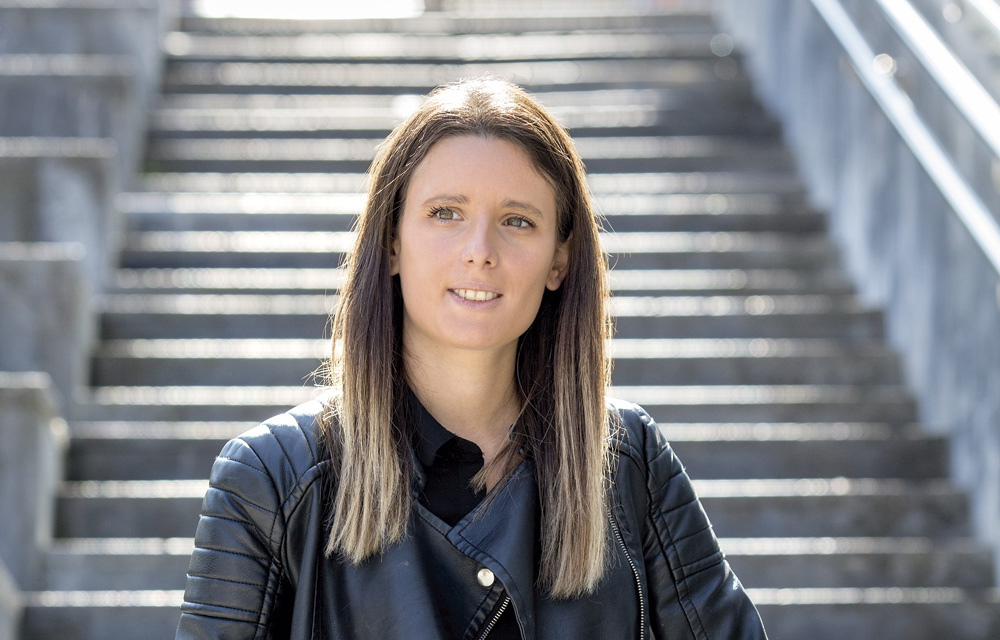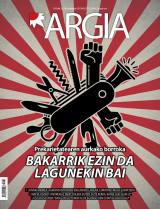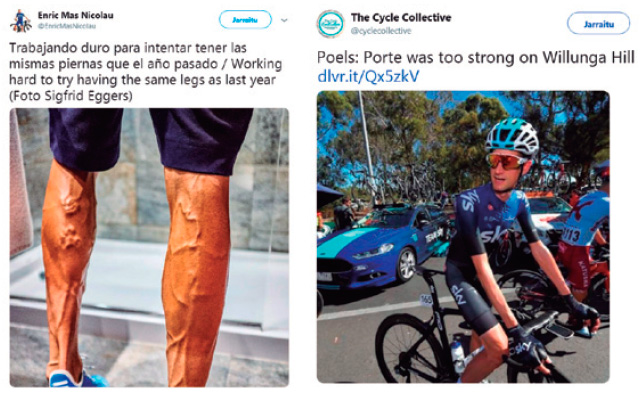"Most people with anorexia are women who care about others"
- For personal and social reasons, Iratxe Osoro has been encouraged to speak in public about anorexia: on the one hand, to clear a phase and, on the other, to break the silence on the subject. So let's talk.

Gizarte-hezkuntzan diplomatua da eta beste hainbat master eta ikasketa egin ditu alor horretan, hala nola droga-menpekotasunari eta beste menpekotasun batzuei buruzko masterra eta sexu-heziketari eta familia esku-hartzeari buruzko ikasketak. Gaur egun, gizarte hezitzaile dabil, behar bereziak dituzten pertsonekin.
Normally, journalists often turn to the interviewees. But in this case you did it to me. Why?
If you're more than just a journalist, and I think as a friend, it was easier to take the step: we have confidence, we've talked a lot about this issue, and, well, the time came. When we went to the farewell concert of the Napoka Iria group, I realized that to start the new stages it is necessary to say goodbye to the previous one. It was a turning point: I decided to say goodbye to anorexia through an interview.
You felt the need to make your experience known to society, right?
Yes. On the one hand, I had the need to close the stage at a personal level, and on the other, I felt a social need, because anorexia is a taboo subject: researchers usually talk about this topic, but we don't talk, and I think it is necessary because we talk about a very common and normal problem. It is very important that we take the floor not only the experts, but also those who have experienced anorexia.
You say it's a taboo, but there's also a lot of talk about anorexia.
It's partly a contradiction, because in the end we see this issue in the day-to-day, there's a lot of cases and there's a lot of talk about it, but only as it generates morbid. Then reality is overlooked. The taboo is the reality of the disease. People easily say that this or another is anoxic, but then when it comes to looking for work, when it comes to studying, the situations that arise when it comes to traveling become taboo and we discriminate against the person.
“It’s easy to escape responsibility, attribute responsibility to advertising, but in the end it’s us who have responsibility”
What is anorexia in your words?
I think anorexia is a lot of stuff. On the one hand, it's a way to maintain your space. People can enter their lives whatever they want, but what they eat doesn't, so when people have invaded their space so much, food can be one of the most unique or unique ways to care for their space.
On the other hand, it's a way of revealing. According to several therapists, for example, Teresa of Calcutta was anorexic. So when you want to achieve a goal, sometimes you do it inappropriately or without looking at yourself, when you have no other way, it's a method you use against you.
Does anorexia mainly affect women?
The highest percentage of people who suffer or have suffered anorexia are women, and it is no coincidence, moreover, most are in a certain way: women who deal with others, but who are ultimately abandoned. Kate Millette said that love has been the opium of women, and to pull it out, I think that in general our opium has been patriarchy, and that our drugs have been aesthetics, submission…
They have told us how we have to be since we were young, they have given us blondes, they have taught us how to care for others and we have left ourselves. Most of the members I've met about anorexia are doctors, teachers, educators -- the ones who give a lot to others. But if you don't give yourself what it needs, you can't give anything to others.
What stereotypes are there about anorexia?
Anorexia is usually associated with a whim, with models… People think it is a disease related to thinness, and often has nothing to do with it. I have met colleagues who had bulimia and weighed more than 100 kilos, so the two things are not united: one thing is physical and another is obsession or disease.
So is that obsession the problem with the spinal cord?
In short, it is a way of dealing with situations. I always say that we all have some addiction, you finish the tests and first you play the machine or go another to play, when you have a problem another cries... Because food can also be worth at the moment, you're just too nervous and you eat a lot of chocolate to relax, and if you get out of your hands and do the same every time you have a problem, you can have bulimia. It's not that different to eat a lot and not eat anything. Anorexia and bulimia go hand in hand. Not eating can be your solution to manage things or not to think about your problems or for a thousand things, and also if people applaud and tell you that you are very beautiful, it strengthens you more that attitude.
“Not eating can be a solution to manage things or not to think about your problems or for a thousand things. In addition, if people applaud you and tell you that you're very pretty, it makes you stronger than that."
We've mentioned a number of basic reasons, what do you identify with?
I think anorexia is a way to get what you want. I always wanted to have a perfect family, a perfect crew, a perfect partner, and it served me in the moment, because in the end I got what I wanted. The problem is what happens when all that falls. When you start to lose, you see that the environment has abandoned you and that you are alone with your head and that you can lose everything you have achieved from one day to the next. It's not a firm foundation.
What has been your way with anorexia? If I am not mistaken, he was in a centre in Barcelona.
The treatment of anorexia must be comprehensive, because one has to work on the one hand the weight or nutrition, then the psychological and family aspect, the friends… It is all one. I started the treatments here in Euskal Herria: first in Gipuzkoa, then I went to Bizkaia, then out of Euskal Herria to Santander, then to Pamplona… but here is a lot of habit of working the weight on one side and then doing the psychological follow-up on your own. That is very difficult. If you take 20 kilos in three months, when you go out, it's clear you're not going to keep it, because you haven't worked and internalized the process.
Another method was used in Barcelona. On the one hand you had room to work on the family theme, you did yoga, you didn't get gymnastics (they didn't take anything away from you), and the food was done gradually. A lot of group support was also used. After all, everything was collected in its entirety and, little by little, time passed and went out to the street. This process was not going on overnight.

There, too, you met people who were in a similar situation. Had it been helpful?
Yes, you realize you're not the only one who has that problem. To some extent, the goal is not to feel lonely. In the street, people judge a lot by ignorance, and in the middle, people understand you. Then it is true that the hardest thing is to return, because you have changed a lot, but people have not. And that's another process. Many times you have to work outside than in the center itself. It’s a constant competition, how I answer this, how I’m going to respond to… I go out to the street and on the marquesina to catch the bus, there’s the image of a girl from Women’s Secret and you think: “I was like that before.” And no, there's a time when you go to that marquee and the ad doesn't matter to you. And that's very difficult.
What resources are available in the CAPV to deal with this type of problem?
On the one hand, there is the ACABE association, the Basque Association against Anorexia and Bulimia, which carries out advisory and mediation tasks. They have a nutritionist and a therapist, but they can't do a full follow-up, because they have a lot of cases, they come in continuously, and they can't take care of you in a personalized way. They are the ones who tell you the resources to know where to go. Next step: private centres or Osakidetza.
I have not found anything integral in the private, yes punctual aids, but then you have to go home and you have to eat. Maybe if at first you get caught, maybe you can get them to channel you, but when you're in the pit, I think it's almost impossible to get out with those means.
In Osakidetza, on the contrary, if it does not weigh less than a certain amount, income is avoided, so the criterion is weight. So, being that the starting point… I understand that it will not be positive for a person to enter if they do not have a very low weight, but with the limitation that they do not take everything in its entirety. You may not need to be 30 kilos to need 24 hours attention, not everything is weight. As I said before, I've met someone who weighs over 100 kilos and is in the hospital, because I couldn't sleep without eating four pies at night. Why doesn't that person need 24-hour care? Here there is an immediate remedy to the physical and the psychological goes apart, but I think it is very difficult to approach the issue like this, especially at the beginning. In any case, I am now following up with a therapist from Osakidetza, and I am very good with him, we are working on issues of all kinds and now it is very useful to me.
“Many times I say that we live in the world of contradictions: you go to the pharmacy and sell weight loss pills next to
antidepressants”
We have mentioned discrimination before: Have you ever been discriminated against by anorexia?
This doesn't happen the same thing as obesity, I haven't been discriminated in the crew by calling me a skinny slut, that's not common, even the opposite happens, you're applauded. But things change if you know you have or have had anorexia.
An obvious case occurred to me: a professor didn't let me practice. He talked to the therapists and they told him that I was fine, that I had been discharged and that I could do internships with complete peace of mind. But the professor refused and told me that he would personally take care that I didn't practice. I finally had to wait, and the next year I did.
What were the practices about?
I worked with pregnant women or children from 0 to 3 years old, with drug dependency problems.
What did that professor think, which was going to be a bad example?
Yes, or I wouldn't be able to. I was OK, like now, so I don't know where he got that from, but the thing looked like this.
Did you ever think of the possibility of denouncing that professor?
We thought, yeah. The centre of Barcelona was very angry and said it was worthy of being published in a central newspaper. The thing is, my name could come out and we thought it might come against us and that I, if I opened up, might have trouble finding work or prosper. We thought it wasn't the best time.
Anorexia is often attributed to fashion advertising and supermodels. Does society, the school, the crew … have no responsibility?
It is easy to escape responsibility and attribute responsibility for everything to advertising, but in the end it is we who have the responsibility. When you're a kid, at school, it's really bad to see that a person eats more, and you usually rule out people who don't come into a canon of perfection. There is very high social pressure.
In addition, I often say that we live in the world of contradictions. You go to the pharmacy and they sell slimming pills along with the antidepressants, or you buy a magazine looking for a recipe to make a cake and in that same magazine there is a plan, “how to lose weight in ten days.” Anyway, of course, advertising has its influence, but if we didn't continue, if we gave it another look, things wouldn't be that way.
Eibarko Nalua talde feministan ibilitakoa da Osoro. Hango esperientziak zer eman dion, horixe galdetu diogu elkarrizketa bukatze aldera: “Hasiera batean helburua zen gaur egungo egoera aldatzea, gertaerak ikusaraztea eta aldarrikapenak egitea, baina, horretaz gainera, taldeak lagundu zidan nire buruarekiko helburu nagusiena lortzen. Erruduntasuna kentzen lagundu dit feminismoak, eta nire gorputza eta burua errespetuz eta merezi duten moduan maitatzen. Barne borroka hasia neukan, baina Nalua topatzeak arnasa eman zidan eta ikusi nuen ez nengoela bakarrik, jende asko dabilela borrokan. Feminismoak eta taldeak eman didate espazioa ni izateko, tabu gabe esateko nola sentitzen naizen, zer behar dudan, zer naizen eta norantz jo nahi dudan”.















